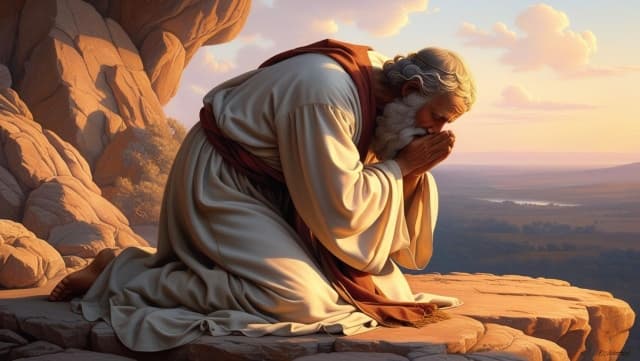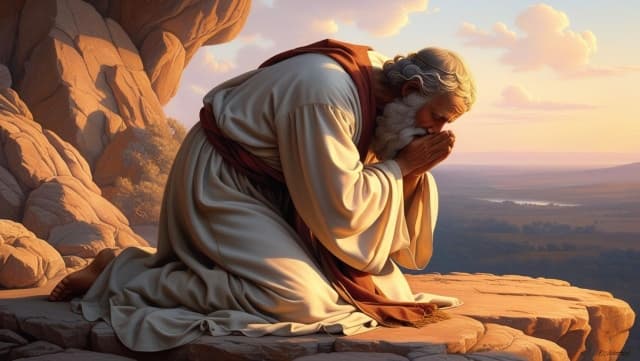The Suffering Servant and the Work of the Church
John Bright, in his book The Kingdom of God: The Biblical Concept and Its Meaning for the Church, traces the theme of the Kingdom of God in the Old Testament and how it finds fulfillment in the message of Christ.
One of the greatest sections of the book is Bright’s description of the work and the mission of the Servant of God. Since few people have read this wonderful book, I have decided to quote part of Bright’s description of the work of the Servant. What follows is taken from The Kingdom of God, pages 150-155:
“The victory of [God’s] Kingdom, sure as God is sure, will be procured not by force or spectacular power, but by the sacrificial labor of God’s Servant. Here we learn of man’s resistance to the Kingdom, a resistance so bitter that it will cost the blood of the Servant. But here we see a God who provides as the instrument of man’s redemption no ritual atonement or external law, but the suffering of that same Servant. God proposes to win his Kingdom through the vicarious sacrifice of his Servant. Here the Old Testament faith leaps quite beyond itself and walks arm in arm with the New.
But who is the Servant? Or, rather, what does he represent? That is far the most important question. And no problem of Old Testament exegesis is more difficult. The church has, of course, always seen in the Servant, particularly in ch. 53, a prophecy of Christ. That this is in a real sense true cannot be doubted; for Christ did, as we shall see, fulfill the pattern of the Servant. Yet it is hardly so simple as a mere prediction of the coming Redeemer. The figure of the Servant is a very fluid one; it seems to refer now to one thing, now to another; and any attempt to interpret it too rigidly will do violence to the evidence and almost certainly distort what the prophet wished to say.
The figure of the Servant oscillates between the individual and the group. In many places throughout the book the Servant is merely Israel (e.g., 41:8; 43:l0; 44:21; 45:4), so much so that the prophet can call the Servant blind and deaf (42: 19)-because that is exactly what Israel has been. In other places, although the Servant is still identified with Israel (e.g., 49:3), it is clear that he is something other than the visible people, because his first duty (49:5) is to lead Israel itself back to its destiny under God. Here it is plain that the Servant is not Israel itself but the righteous “Remnant” in Israel (e.g., 44:l; 51:1, 7), the true Israel which is obedient to God’s calling and is a witness to his power in the world (49:l-6, 8-13; 42:l-7). But at all times the Servant is described in individual terms. And it is clear that sometimes this figure overshoots all that Israel, all that the true Israel, all that any individual in Israel ever was, and becomes a description of an ideal figure. He is the coming Redeemer of the true Israel who in his suffering makes the fulfillment of Israel’s task possible; he is the central actor in the “new thing” that is about to take place; he is, we might say, the “new Moses” in the new Exodus now shortly to begin. The Servant? He is Israel; he is the true and loyal Israel; he is the great Servant who will be leader of the servant people–all in one!
But here is the most important point: however the Servant is pictured, even when conceived as the coming Redeemer, the Servant mission is always laid before Israel as her calling and destiny. It is not enough to describe the Servant; the call goes out: “Who among you fears the Lord and obeys the voice of his servant . . . ?” (50:10.)
Israel is to be the people of the Servant; only so will she be the people of God. As the Servant, prophetlike, proclaims the righteousness of God to the world, so must Israel; as the Servant, priestlike, mediates the salvation of God to men through his suffering, so must Israel. As the Servant gains a victory and a Kingdom through his sacrifice, so must Israel know no other royal path. Israel is to follow the Servant, take up the cross of the Servant, share in the Servant’s redemptive mission. The Servant can no more be separated from Israel than Christ can from his Church, to which he said: “If any man would come after me, let him deny himself and take up his cross” (Mark 8:34). Israel is therewith forbidden ever to go back to the old lines. She is to take the road of missionary suffering in the footsteps of the Servant–for this alone is the pathway of the Kingdom.
Here at last is a word deep enough to reach down to the depths of the national humiliation and to speak to it. Here is a word, vast as the world was vast, capable of giving a people lost and astray destiny and direction. It is certainly a far deeper interpretation of suffering than any that had ever been heard before. Men have always wanted an explanation of tragedy, and those beaten Jews of that day must have needed it desperately. Prevailing Jewish belief would have tended to explain suffering as the punishment for sin (cf. 53:4b), as Job’s comforters did. The prophets had explained the national calamity in precisely those terms, and Second Isaiah had seconded the explanation (cf. 42:24-25). But it was obvious even then that this could not be a completely satisfactory answer. Deserts and awards did not always balance by any means, as Habakkuk saw on a national scale and Job on a personal one. It was easy for the Jew to feel that his people, sinful though they may have been, had been punished out of all proportion to their deserts. Israel had “received from the Lord’s hand double for all her sins” (40:2). How is the overplus to be explained?
Now Israel’s faith had, in fact, already reached far beyond an equation of suffering and sin, although small and dogmatic minds which liked neat explanations for everything clung to the equation stubbornly enough. It was plain that there was a suffering which came not from having sinned, but precisely from having done the will of God. The prophets had been living illustrations that to obey and to declare the Word of God costs exactly suffering. Jeremiah was a prime and recent example of the cost of choosing the Kingdom of God above the Kingdom of Judah.
He became like the Servant, to use his own words, ”a tame lamb led to the slaughter” (Jer. 11:19; cf. Isa. 53:7). Understanding men in Israel certainly knew this. But here is something far higher. For suffering is not merely the consequence of the Servant’s task-it is the organ of it. His redemptive work and his world-wide victory will not only cost suffering as every battle costs casualties; it cannot be accomplished at all except by means of suffering. The victory of the Kingdom of God is achieved through the vicarious sacrifice of the Servant.
A more powerful summons to the people Israel could hardly be imagined. It was no less than an entire reinterpretation of their destiny as the people of God. It was a message of comfort, indeed, but not comfort as we are prone to understand that term. For here is no soothing syrup, no pink pills to be taken against fear, no technique for dealing with that frustrated feeling, no argumentation or answers to querulous questions. Here is a summons to stand again as the people of God and to take up a mighty task. It is the sort of summons that makes men into a people, for it calls them to the service of something greater than themselves.
The prophet addresses Israel as the people of the Servant. You have always, said he, thought yourselves a people chosen of God for a purpose, and so you were. But you forgot that destiny and were grievously punished, so grievously that you could not understand it and doubted all that you had believed in. Now, lift up your hearts! All is not ended! Before you is a new start and a greater destiny. God is calling forth for himself a true people, the people of the Servant. He is calling you to be that people and to serve his purpose. You are to be the vessels of his redemption, to bring Israel back to itself and to proclaim his salvation in the entire world. To be sure, you will find in this destiny no exemption from suffering, but precisely a summons to it. Yet suffering will be transfigured: no longer will it be to you brute agony without meaning, but the very instrument of redemption. In it you will enter into the very character of God’s Servant and share in his redemptive purpose. Through your agony your original destiny in Abraham to be a blessing to all mankind is before you. And the victory is sure, for God is sure.
Clearly no profounder answer to suffering could be given than that. Suffering is not explained; it is transcended in destiny, as the people of the Kingdom of God.
But we must close with an anticlimax. There will be no apologies for this; for the anticlimax is not of our making, but is written in history. The Servant had few progeny. The light of the Servant was, we may suppose, too blindingly bright for human eyes, and men could not face it. To be sure, the great missionary message of the prophet was not lost. It finds its echoes in later writings (notably in the book of Jonah), and Judaism certainly did make proselytes. But Judaism never properly became a missionary religion. On the contrary, it tended to draw ever more tightly into itself. Nor did the Servant ever catch the popular fancy. True, the figure of the Servant was related to the sufferings of Israel; so much so that in later literature, notably in some of the psalms, the “poor and needy” have become virtually a synonym for the true people of God (we shall hear more of “the meek” who shall “inherit the earth; Matt. 5: 5). But Judaism could not see the Servant as Messiah. While there are a few hints of a lowly and suffering Messiah in later literature (e.g., Zech. 9:9; 12:10), they are very few. The Jews did not want a suffering Messiah. They, like ourselves, desired other things.
So the Servant went underground, as it were, and there lay dormant like seed under frozen soil. “In the fulness of time” there would come one who would say, “Today this scripture has been fulfilled in your hearing” (Luke 421; cf. Isa. 61:l-2); who in his sacrificial labor, suffering, and death, quite literally “took upon him the form of a Servant” (Phil. 2:7 KJV). And when this same Jesus said to his disciples, “Go ye into all the world,” he did no more and no less than lay upon them the Servant destiny.
And that, indeed, gives us to think. For as members of the Church of Christ our calling is that Servant calling. How seriously do we take it? Do we understand it at all? The world-wide mission of the Church we accept. We believe in one God; we declare that his Kingdom is over all the earth; we send missionaries to preach the gospel in far lands. Yet how little we have drawn the consequences of that great theology! Believing that one God is the God equally of all who call upon him, how often we seek to restrict the Kingdom along sectarian, or national, or racial lines–denying those beyond those lines comfortable fellowship with us in the Church of Christ How often, by the small righteousness we offer, we withhold vast areas of life from the domain of God’s Kingdom, and even declare that the Word of God has no business to speak there! Over the centuries the Servant is speaking to us, demanding that we get this straight over the gunsights: the Kingdom of God knows no man-made limitations. The church which seeks, as did old Israel, to restrict the Kingdom to itself-whatever its official theology–simply does not hold a pure monotheism, but is worshiping a small, strange god made in its own image.
As for the cross of the Servant, it is not strange to us. We own to a crucified Saviour. In that we stand with the mainstream of Christian faith from the beginning onward, and we do well to do so. We enthrone that crucified Saviour in stained glass, wood, and stone-and in doctrine. To that cross we look for salvation. But we want that cross not at all. Indeed we would have it the chief business of religion to keep crosses far away. We want a Christ who suffers that we may not have to, a Christ who lays himself down that our comfort may be undisturbed. The call to lose life that it may be found again, to take up the cross and follow, remains mysterious and offensive to us. To be sure, we labor to bring men to Christ, and we pray, “Thy kingdom come.” But our labor we see as a labor of conquest and growth, successful programs and dollars. Can it be that we are seeking to build the Kingdom of the Servant-without following the Servant? If we do so, we will doubtless build a great church-but will it have anything to do with the Kingdom of God?
Let us, then, be reminded that the task of the Church is not and cannot be other than the Servant task. We pray as we have been taught to pray, “Thy kingdom come.” And the answer we get is the answer of the Servant: “If any man would come after me, let him deny himself and take up his cross.” We renew our prayer, “Thy kingdom come,” because we have no other prayer to pray. But we renew it with the deep at confession of sin: have mercy upon us, for we are unprofitable servants!”
I recommend The Kingdom of God: The Biblical Concept and Its Meaning for the Church to people who desire to gain a good understanding of how the concept of the Kingdom of God is developed in the Bible.
Claude Mariottini
Emeritus Professor of Old Testament
Northern Baptist Seminary
NOTE: Did you like this post? Do you think other people would like to read this post? Be sure to share this post on Facebook and share a link on Twitter or Tumblr so that others may enjoy reading it too!
I would love to hear from you! Let me know what you thought of this post by leaving a comment below. Be sure to like my page on Facebook, follow me on Twitter, follow me on Tumblr, Facebook, and subscribe to my blog to receive each post by email.
If you are looking for other series of studies on the Old Testament, visit the Archive section and you will find many studies that deal with a variety of topics.












